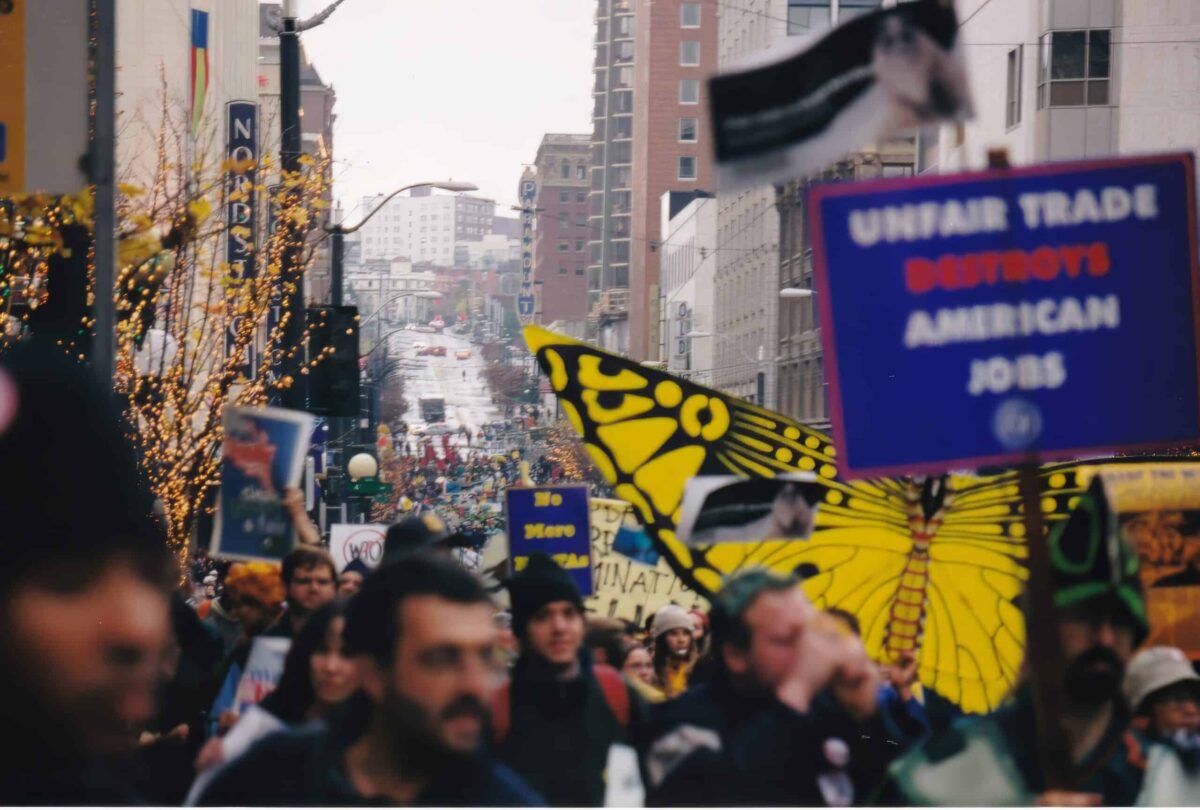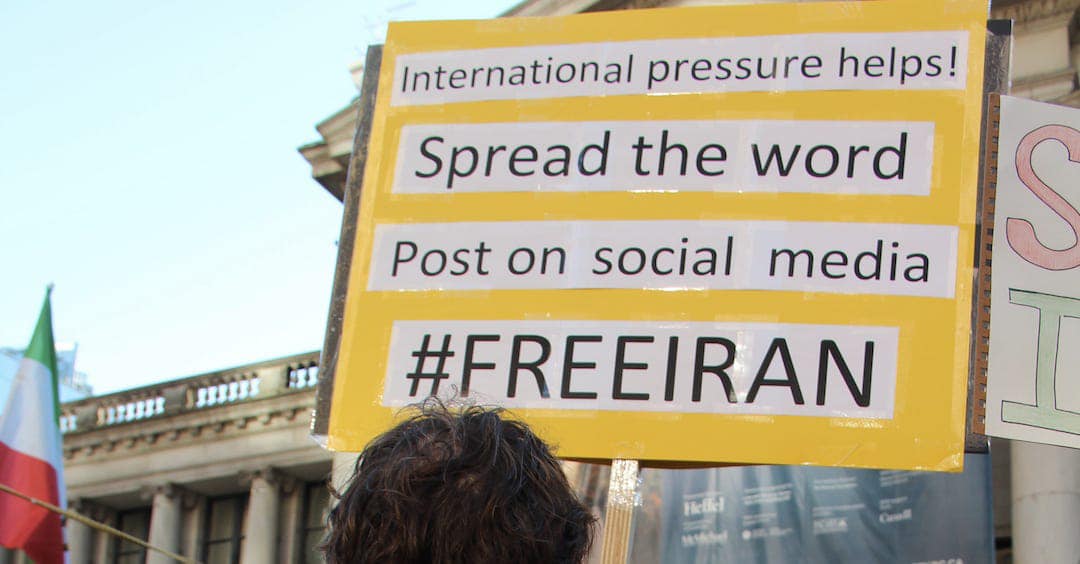

A Quarter-Century Later, Battle of Seattle Protesters Proved Right
by Max Wilbert | July 30, 2024
On November 30th 1999, more than 50,000 people gathered in Seattle to protest a meeting of the World Trade Organization, an international group dedicated to promoting economic growth. What happened next would be immortalized as “The Battle of Seattle.”
Protesters swarmed the downtown area, blocking roads in acts civil disobedience and forming a human chain to stop delegates and corporate representatives from accessing the convention center where the WTO meeting was being held. Meanwhile, more radical groups smashed windows of businesses — most famously targeting Nike over their sweatshop labor practices — and caused $20 million in damage.
In response, the Mayor and Governor mobilized thousands of police and National Guard, who shot tear gas, stun grenades, and pepper spray into the crowd and arrested more than 500 people (about a quarter of whom were just in the wrong place at the wrong time).
The motivations behind the WTO protests were as diverse but interlinked as the groups which participated.
Organized labor and human rights activists saw the meeting as a power grab aiming to open national borders to the flow of corporations while restricting worker movement. This, they argued, would lead to twin disasters: offshoring jobs from wealthy nations and leaving workers penniless here, while creating new markets for cheap labor in poor countries with low wages and practically non-existent labor protection laws.
Environmentalists saw the meeting as an oligarch’s summit to organize efficient and rapid extraction of resources from the environment — in other words, to turn a living planet into dead commodities and into profit as quickly as possible. They argued that corporate-friendly neoliberal trade policies would decimate environmental protection worldwide and facilitate ever-greater “externalization” of costs in the form of pollution and ecological sacrifice zones.
Students, faith groups, indigenous communities, and racial justice organizations also saw the WTO and their brother organizations — The World Bank and International Monetary Fund — as being instruments of a violent form of economic neo-colonialism.
While the protests in November 1999 were successful at shutting down the WTO summit, the neoliberal agenda of so-called “free trade” has been the dominant economic paradigm for most of the intervening years. Since 1999, the size of the global economy has more than doubled from $55 trillion to nearly $120 trillion. But contrary to what you might think, this hasn’t effectively reduced poverty; the vast majority of this explosion in wealth has gone to rich.
On the ecological front, the neoliberal project of free trade, globalization, and deregulation has skyrocketed an already destructive system into the stratosphere.
Annual greenhouse gas pollution has increased from 25 billion tons in 1999 to 37 billion tons in 2022. In 1999, humans used about 120,000 terawatt-hours of energy, but by 2022 that had increased to 179,000 terawatt-hours — nearly a 50% jump. To meet that demand, fossil fuels and biomass (cutting down trees and burning them) accounted for nearly 80% of the new energy production in this period.
Plastic production has more than doubled since 1999, and in total more than two-thirds of all plastic ever created has been pumped out of factories in the years since. Global population increased from 6 to 8 billion. And the abundance of wildlife plummeted an average of 18% between 1999 and 2018 — when measured against an already seriously diminished 1970 baseline.
Almost a quarter-century later, the goals and messages behind the WTO protest have been proven correct. Corporate globalization has been a disaster for workers, the poor, and the planet. Wealth inequality has increased in almost all parts of the world, including strikingly inside the United States. Meanwhile, in poor nations like Mexico and Bangladesh, sweatshops that often amount to virtual slave labor have proliferated, and the dismantling of tariffs and trade restrictions in favor of neoliberal free trade policies has destroyed domestic markets such as traditional organic farming.
The WTO protests also marked a turning point in police tactics. Since the Civil Rights Movement, police had taken a hands-off approach to policing protests via a strategy of “negotiated management,” recognizing that repression would often backfire. But the leaderless structure and radical intransigence of protesters in the Battle in Seattle meant there was no one to negotiate with — a situation that has become normal for mass protests as strategic planning and coordination has become passe.
In response, U.S. police agencies have taken counterinsurgency-based approach to mass protests in the 21st century, with heavily armored riot police, sound cannons, tear gas, and armored vehicles being typical. Empires often end up using techniques they originally perfected putting down rebellions in their overseas colonies against their own people.
I grew up in Seattle, and I was eleven years old on November 30th, 1999, so I didn’t participate in the protests — although my dad and sister did. But I came of age politically in the years afterwards, and learned many lessons from Seattle.
First, I learned about the danger represented by rampant industrialization and profit-driven corporate agendas. In the new era of greenwashing and the return of superpower conflicts, this critical lens is incredibly important.
Second, I learned about the systemic linkages between different social and environmental issues. The cross-movement and internationalist alliances built to oppose the WTO gave the movement strength, and represent an important strategic model for activists and community organizers in the future.
And third, I learned about the effectiveness of increasing collaboration between governments, corporations, and security forces to advance and protect imperialist growth agendas. That lesson would be driven home a few years later when I marched through Seattle on February 15th, 2003 to oppose the invasion of Iraq in the largest day of mass protest in world history. Fifty thousand people gathered in Seattle that day, and as many as ten million globally, but our voices were ignored.
The 1999 WTO uprising and the anti-war movement of the early to mid-2000’s marked a radical turning point in my political philosophy, one which is becoming increasingly relevant today to young climate activists and environmentalists confronting stonewalling governments and grappling with the greenwashing lies they’ve been fed by big NGOs and techno-utopians.
I used to believe that our democracy was broken, but these events helped me to realize that it was functioning quite well indeed. As founding father and constitutional architect James Madison once said, “The primary function of government is to protect the minority of the opulent against the majority.”
If this is true — and all evidence points towards it being so in this country — then organized political resistance, not the pipe dream of top-down institutional change, is our only hope for a better future. As my friend the poet Dominique Christina said, “Revolution is the sound of your heart still beating. And as long as it is, you have work to do. Do it. Without apology. Do it. Bravely and nobly. Do it. Exist, insist and by all means, resist.”
Postscript: I’ve been meaning to publish this piece for some time, and was spurred to do so after reading fellow Garfield High School graduate
I think there is some merit to Vincent’s arguement, but I would argue these policies are mostly aimed at protecting U.S. superpower status in the face of growing Chinese and BRICS competition, and that appealing to American workers disenfranchised under neoliberalism is more of a bonus exploited for electoral and populist appeal. The role of workers in extraction and manufacturing supply chains, and the neocolonial nature of international economic relationships is a theme I’ll be exploring in some upcoming pieces.
Some readers may have been directly involved in the WTO protests. If so, I’d love to hear your strategic insights in the comments. Thanks!





0 Comments